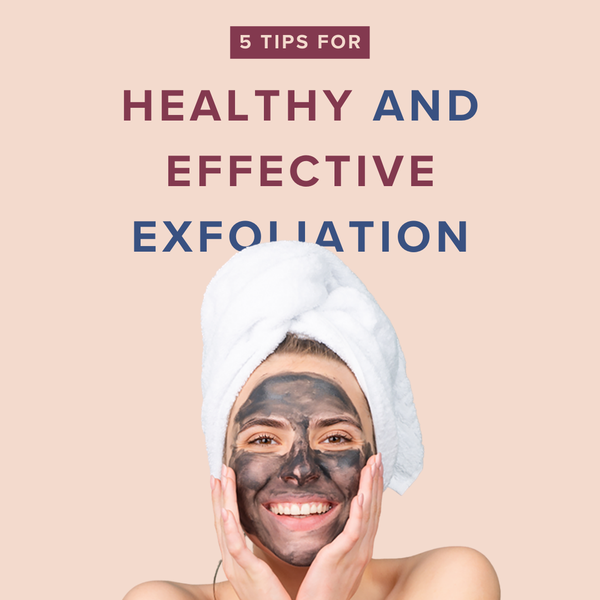5 Tips for Healthy and Effective Exfoliation

FREE shipping on orders of $50+ with code SHIP50
Exfoliation is essential for healthy skin. When we exfoliate, we remove dead skin cells from our skin's outermost layers to bring fresh, glowing skin underneath. Exfoliation can also be harmful. Using the wrong products, not knowing your skin, or generally not being mindful of the products we put on our skin could have unintended consequences. These actions could result in irritated, dry, or damaged skin or skin barrier.
Here are our five tips to consider when cleaning and exfoliating your skin to maximize your results and your safety.
1. Know your skin
The first step to any evaluation is to know your skin type and what it needs. Do you have sensitive skin? If so, you want to be extremely careful about what you put on your face and the strength of exfoliators used.
Dry skin requires a different approach, as your skin may only get itchier as a result. Those with oily skin should consider what other functional ingredients are in the product to mitigate excess oil or worsen the issue.
2. Understand what's doing the exfoliation
There are generally two types of exfoliators, physical and chemical. Both are effective. Physical exfoliators are scrubs, beads in products, or some natural (ex: crushed walnut shells) materials that can rub against the skin and remove the top layer. Physical exfoliators may not be best suited for sensitive skin types, and you should be careful when applying them, as you could be too aggressive. Chemical exfoliators are acids or other applications that chemically remove the top skin layers. You'll find some over-the-counter (OTC) acne products that contain salicylic acid, a potent chemical exfoliator. These offer a good solution, but you're applying all the acid at once, so sensitive skin users may get an intense irritation with a long recovery time.
Don't forget that shaving is exfoliating! Using exfoliants after shaving may provide a deeper exfoliation that may be beneficial but also could end up being harmful.
3. Know your products and what else is inside
It's not just the exfoliating active that's important, but the supporting ingredients make a HUGE difference. As you expose the fresh new skin, you're also subjecting it to all the other elements in the mixture you're applying. For example, fragrances smell tremendous but can work to irritate the skin, so they must be carefully selected. Ingredients like aloe can help to soothe the skin while you're exfoliating. Our Clarifying Cleanser contains aloe and charcoal to help calm the skin while also extracting as much from the newly opened pores as possible. Charcoal works like a magnet, pulling other dirt off your skin for the rinse off.
Something else to consider here is what you plan on doing after cleansing. If you're washing your face in the morning and plan on applying makeup, you should consider the type of products you are using after exfoliating. At night, the same concept applies, and you should be mindful of what you are putting on the skin after exfoliation.
4. Follow up with support.
Based on the other ingredients inside the cleanser and your skin type, you may consider what else your skin needs. We certainly recommend our soothing serum (duh, it's in the name) to help soothe your skin and nourish it. A moisturizer is usually the best follow-up tool. If you're going outside, consider your sunscreen and what else you may need to protect your freshly exfoliated face. You also want to ensure that what you put on your skin won't cause more issues later. Think about this, you just worked hard to remove the dead skin on top, open up your pores, and now you could potentially fill them with unsuited chemicals.
5. Schedule your treatments
As you see, exfoliation can vary, and your schedule should reflect that. You may look into a different cleanser for day and night or a deeper treatment you do every week or month. For example, you may want to use a very gentle, mild cleanser in the morning and night, but once a week, use a mask to get deeper into the pores. You may consider using a cleanser that can help with makeup removal at night to save time.
Be mindful of what you put on your skin, and you'll be able to get the results you want with minimal issues.







